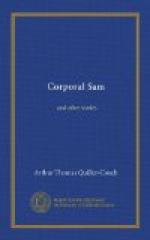As if it had been waiting to confirm the prophecy, a voice called, ‘Charis! Charis!’ almost on the instant.
‘That’s my name,’ said the child, helping herself to another fig, as a middle-aged face, wrinkled, with a complexion of parchment under a mass of tow-coloured hair, peered in at the doorway.
The colonel rose. ‘Your niece, madam,’ he began, ’has been entertaining me for these ten minutes—’
With that he stopped, perceiving that, after a second glance at him, the eyes of Aunt Netta, too, were growing round in her head.
’Charis, you naughty child! Sir, I do hope—but she has been troubling you, I am sure—’ stammered Aunt Netta, and came to a full stop.
Charis clapped her hands, with a triumphant little laugh.
‘But I knew him first!’ she exclaimed, ’Yes, Aunt Netta, it’s him!— it’s him, him, HIM! And isn’t it just perfectly glorious?’
’You must excuse my niece, sir—that is to say, if you are really Colonel—’
’Baigent, ma’am. I think you know my name; though how or why that should be, passes my comprehension.’
She bowed to him, timidly, a trifle stiffly. ’It is an honour to have met you, sir. I have an aunt at home, an invalid, who will be very proud when she hears of this. She has followed your career with great interest—I believe I may say, ever since you were a boy at the college. She has talked about you so often, you must forgive the child for being excited. Come, Charis! Thank Colonel Baigent, and say good-night.’
‘But isn’t he coming with us?’ The child’s face fell, and her voice was full of dismay. ’Oh! but you must! Aunt Louisa will cry her eyes out if you don’t. And on Christmas Eve, too!’
Colonel Baigent looked at Miss Netta.
‘I couldn’t ask it—I really couldn’t,’ she murmured.
He smiled. ’The hour is unconventional, to be sure. But if your aunt will forgive a very brief call there is nothing would give me greater pleasure.’
He meant it, too!
He fetched his hat, and the three passed out together—down the High Street, through the passage by the Butter Cross, and along the railed pavement by the Minster Close. On the colonel’s ear their three footfalls sounded as though a dream. The vast bulk of the minster, glimmering above the leafless elms, the solid Norman tower with its edges bathed in starlight, were transient things, born of faery, unsubstantial as the small figure that tripped ahead of him clutching a pair of dancing-shoes.
They came to a little low house, hooded with dark tiles and deeply set in a narrow garden. A dwarf wall and paling divided it from the Close, and from the gate, where a brass plate twinkled, a flagged, uneven pathway led up to the front door. So remote it lay from all traffic, so well screened by the shadow of the minster, that the inmates had not troubled to draw blind or curtain. Miss Netta, pausing while she fumbled for the latchkey, explained that her aunt had a fancy to keep the blinds up, so that when the minster was lit for evensong she might watch the warm, painted windows without moving from her couch.




